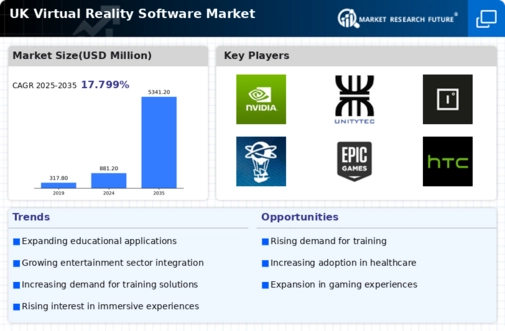Advancements in Gaming Technology
The UK virtual reality software market is witnessing rapid advancements in gaming technology, which is a primary driver of market growth. The gaming sector has embraced VR as a means to create more immersive and engaging experiences for players. Recent statistics indicate that the UK gaming market is expected to reach a value of £7 billion by 2026, with VR gaming contributing a substantial portion of this revenue. Developers are increasingly focusing on creating high-quality VR content that leverages cutting-edge graphics and interactive gameplay. This trend not only attracts gamers but also encourages investment in VR software development. As a result, the UK virtual reality software market is likely to see a proliferation of innovative gaming applications, further solidifying its position as a leader in the global VR landscape.
Government Support and Initiatives
The UK virtual reality software market is experiencing a boost from government support and initiatives aimed at fostering innovation in technology. The UK government has recognized the potential of VR as a transformative technology and has implemented various programs to support its development. For instance, funding opportunities and grants are available for companies engaged in VR research and development. Additionally, initiatives such as the UK Research and Innovation (UKRI) program are designed to promote collaboration between academia and industry, facilitating the growth of VR technologies. This supportive environment is likely to encourage more businesses to invest in VR software solutions, thereby enhancing the overall market landscape. As a result, the UK virtual reality software market is expected to thrive, driven by both public and private sector collaboration.
Increased Investment in VR Startups
The UK virtual reality software market is benefiting from a significant increase in investment directed towards VR startups. Venture capital firms and angel investors are recognizing the potential of VR technology across various sectors, including entertainment, education, and healthcare. In 2025, investment in UK-based VR startups reached approximately £500 million, reflecting a growing confidence in the market's future. This influx of capital is enabling startups to develop cutting-edge VR applications and solutions that cater to diverse consumer needs. Furthermore, established companies are also investing in VR innovation, fostering a competitive landscape that drives technological advancements. The UK virtual reality software market is thus poised for robust growth as new players enter the market and existing companies expand their VR offerings.
Growing Demand for Remote Collaboration Tools
The UK virtual reality software market is experiencing a notable surge in demand for remote collaboration tools. As businesses increasingly adopt hybrid work models, the need for immersive virtual environments that facilitate effective communication and teamwork has become paramount. According to recent data, the market for virtual collaboration tools is projected to grow at a compound annual growth rate of 25% over the next five years. This growth is driven by the desire for enhanced productivity and engagement among remote teams. Companies are investing in VR solutions that allow employees to interact in a shared virtual space, thereby improving collaboration and reducing the limitations of traditional video conferencing. The UK virtual reality software market is thus positioned to benefit significantly from this trend, as organizations seek innovative ways to maintain connectivity and foster a collaborative culture in a remote work setting.
Rising Consumer Interest in Immersive Experiences
The UK virtual reality software market is witnessing a rising consumer interest in immersive experiences, which is driving demand for VR applications across various sectors. Consumers are increasingly seeking out experiences that offer a sense of presence and engagement, whether in gaming, virtual tourism, or training simulations. Recent surveys indicate that over 60% of UK consumers express interest in using VR for entertainment and educational purposes. This growing appetite for immersive content is prompting developers to create innovative VR applications that cater to these preferences. As a result, the UK virtual reality software market is likely to see an expansion in the variety of VR offerings available to consumers, further stimulating market growth and encouraging new entrants to explore the potential of VR technology.






















